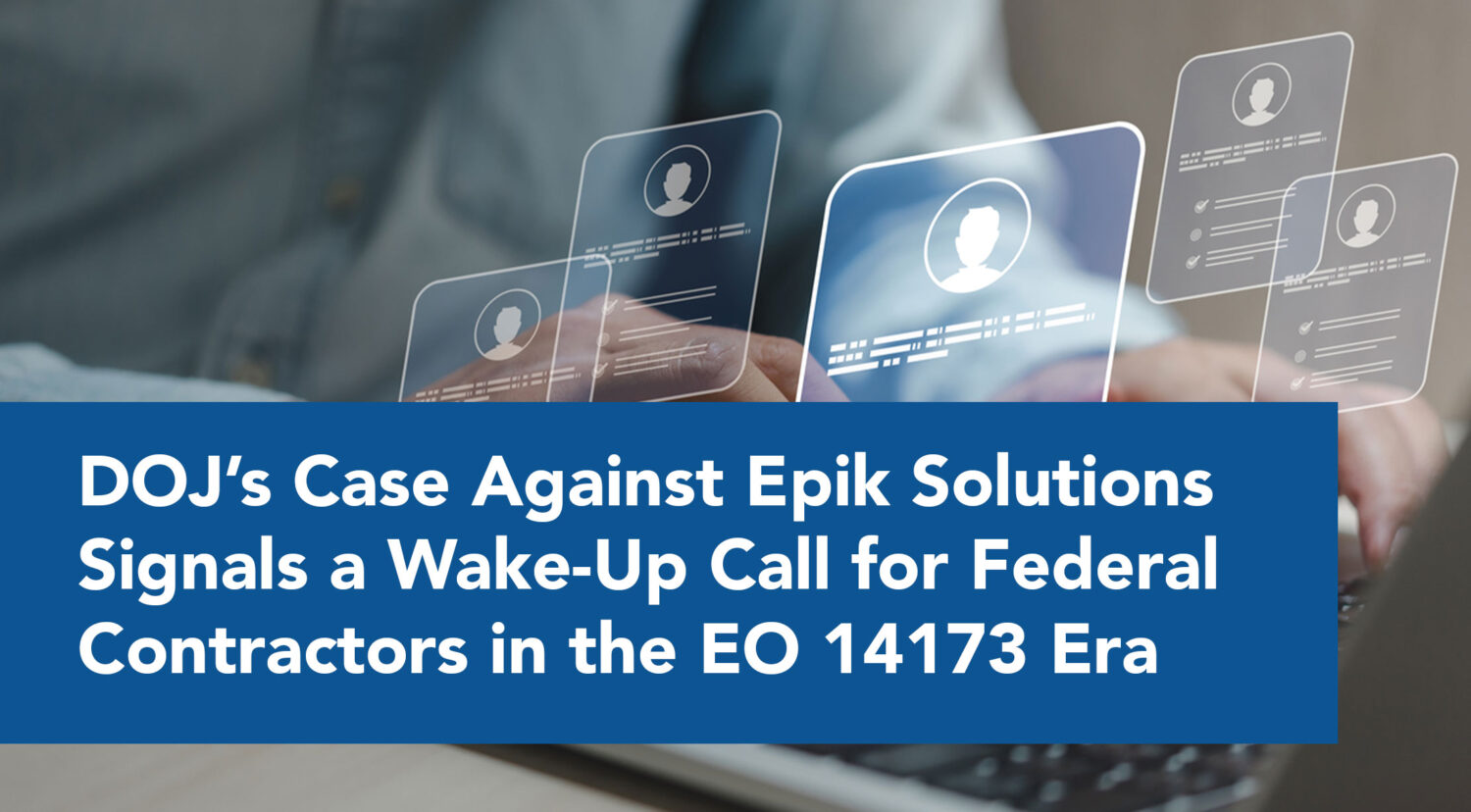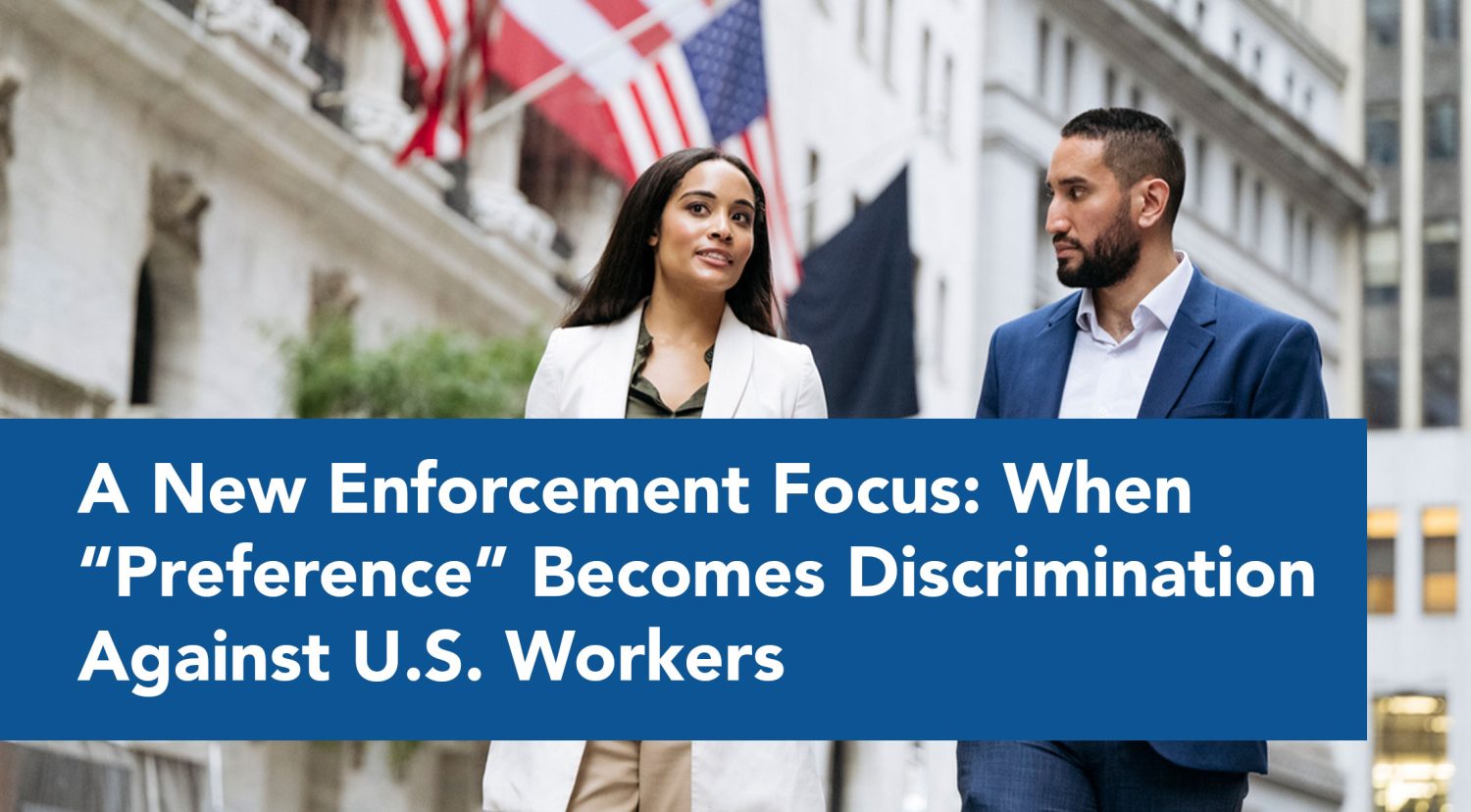

The U.S. Department of Justice (DOJ) sent a clear message with its announcement of a settlement with Epik Solutions, a California-based technology recruiting firm. The company was found to have violated the Immigration and Nationality Act (INA) by unlawfully preferring foreign H-1B workers over qualified U.S. applicants, a discriminatory practice that cost the firm nearly $72,000 in civil penalties and triggered mandatory training and policy reform.
This enforcement action marks the first since the DOJ re-launched its Protecting U.S. Workers Initiative, and it offers timely lessons for federal contractors navigating compliance under Executive Order 14173, an order that demands non-discriminatory employment practices and places significant risk on false certifications.
Key Takeaways for Federal Contractors
- Discrimination is no Longer Just About Race and Gender
The case against Epik underscores that discriminatory hiring practices can extend to citizenship or immigration status, especially when employers favor temporary foreign workers over equally or better-qualified U.S. citizens or lawful permanent residents.
EO 14173 requires federal contractors to certify their compliance with anti-discrimination laws, a process that could trigger liability under the False Claims Act if false or negligent attestations are made. This means even unintentional exclusionary practices, such as poorly worded job ads or internal bias in sourcing, can lead to real consequences.
- Compliance is Not a Paper Exercise
The settlement included more than just a fine, Epik Solutions is now required to revise its employment policies and undergo regular training. For federal contractors, this aligns with EO 14173’s emphasis on “real” compliance backed by documentation, data, and accountability.
Workplace audits, revised policies, and evidence-based training programs are no longer optional best practices, they are necessary shields against federal enforcement.
- Recruitment Strategies Must Withstand Scrutiny
Federal contractors should review their recruitment practices and sourcing platforms to ensure they are not inadvertently excluding protected classes, including U.S. workers, veterans, individuals with disabilities, or older workers.
The Epik case was triggered by public job advertisements that were explicitly exclusionary. For contractors who advertise on niche job boards or rely heavily on agency recruiters, this ruling is a reminder: you are responsible for the outcomes of your hiring pipeline, even if a third party is involved.
A New Compliance Landscape Under EO 14173
While the revocation of EO 11246 eliminated the formal requirement for Affirmative Action Plans for women and minorities, EO 14173 raised the stakes by mandating workforce equity through a certification of nondiscrimination.
This shift demands a deeper level of analysis and oversight, including:
- Merit-based selection analytics
- Non-discriminatory compensation and promotion reviews
- Legal defensibility of hiring and sourcing practices
- Ongoing workforce audits across all categories
Learning Experience: From Risk to Readiness
The lesson from the Epik Solutions case is not just that companies can be penalized, it’s that the government is actively looking for violators, especially those in the federal contracting space. Agencies like the DOJ and EEOC are increasingly coordinating to ensure that certified contractors are not just checking boxes but operating free of systemic bias.
Contractors must ask themselves:
- Would our hiring data and job ads stand up to scrutiny today?
- Have we analyzed our practices for unintended exclusion—across race, gender, age, disability, veteran status, and now, citizenship?
- Is our certification under EO 14173 backed by proof—or just paperwork?
Final Thoughts: Compliance is Now a Competitive Advantage
In a market where enforcement is rising and contract dollars are at stake, proactive compliance is more than protection, it’s a differentiator. Contractors that build fair, inclusive, and merit-based hiring systems will not only reduce risk, but they will also build better teams.
If you’re unsure whether your hiring practices comply with EO 14173 and the broader anti-discrimination framework, we can help. Contact us for a Workforce Compliance Assessment or Hiring Risk Review tailored to your federal obligations.




